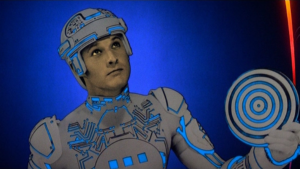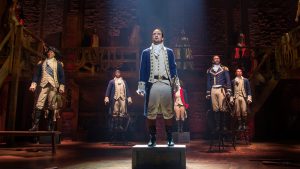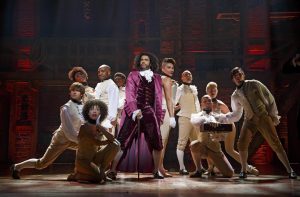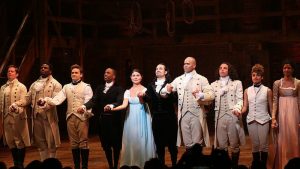SPOILERS FOR AGENTS OF S.H.I.E.L.D. AHEAD!
Any story set in the 1980’s has to feature at least a little rock and roll, and the latest episode of Agents Of S.H.I.E.L.D. is no exception: even while murderous robots are prowling the Lighthouse in search of targets and S.H.I.E.L.D.’s digitized enemies are plotting their comeback, it’s hard not to feel at ease with some classic tunes blasting in the background. This is a mostly light-hearted and fun episode of the long-running Marvel series – at least until the aforementioned robots reveal their extensive catalog of weaponry (including circular saws, drills, laser beams, etc) and start killing people in the hallways of S.H.I.E.L.D. HQ, leading to a very unsettling game of cat-and-mouse in the dark.
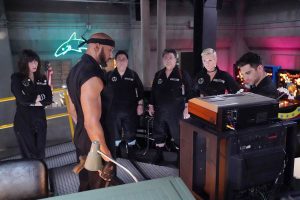
I was hesitant at first, because we pick up right where we left off with Director Alphonso “Mack” Mackenzie (Henry Simmons) and Deke Shaw (Jeff Ward) stuck in the 1980’s while the Zephyr One – and the rest of the Agents of S.H.I.E.L.D. – zip off to a new time and place without them, and almost immediately we watch as Mack, riddled with feelings of grief and guilt over the death of his parents in last week’s episode, turns to the same methods of coping that Thor did in Avengers: Endgame; stress eating, drinking, failing to take care of himself. But while I was initially worried that, much like how Thor’s grief process was made the butt of several unfortunate jokes in Endgame, Mack’s process would similarly be played for laughs, that wasn’t the case at all. There are no jokes or rude comments aimed at Mack, at least not by characters aware of what’s he going through: there’s only love, understanding and concern, which is exactly what I wanted to see from the other Avengers when they greeted Thor after his five-year long absence. And shockingly it’s Deke Shaw who manages to coax Mack back out into the world.
Now, I’ve never liked Deke Shaw. When he was first introduced in the fifth season, he felt like a cheap, even boring, Star Lord knock-off – and I already don’t like the Marvel Cinematic Universe’s Star Lord. He’s had some cool moments and a lot of clever, funny moments during his time on the show. But this is the first time that he’s ever felt truly important to the Agents Of S.H.I.E.L.D. team: while Mack is off the grid, it’s Deke who becomes the leader at the Lighthouse, successfully reconstructing Phil Coulson (Clark Gregg) and translating him over to a massive computer on wheels, while still finding time to organize a band. Without having to sacrifice any of his unique character traits, Deke has quickly become one of the final season’s most valuable players.
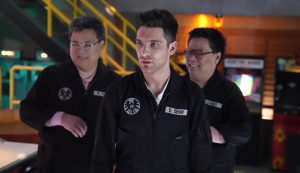
Mack and Deke are joined on their 80’s jaunt by a strange group of new agents: Olga (Jolene Andersen), a Russian Annie Lennox-lookalike with a talent for blowing things up; Tommy and Ronnie (John and Matt Yuan, respectively), twin brothers who come off as thinly-drawn caricatures rather than actual characters; and Roxy Glass (Tipper Newton), who gets stuck with Mack during the robot invasion – that’s not really a personality trait, but it’s all she’s got. There are a couple other new S.H.I.E.L.D. agents as well, but their purpose is solely to be murdered by robots.
Speaking of which, it’s time for a hot take: the robots in this episode, who are basically Daleks (they literally scream “Exterminate!” at one point) with sawblades, are actually better antagonists than all of the Chronicoms we’ve seen in this season so far. Yes, they’re still technically controlled by one Chronicom in particular, the Predictor Sibyl (Tamara Taylor), but she’s just an automated voice for most of the episode, until the very end when it’s revealed that her brain or consciousness or something has been installed in a computer similar to Coulson’s new lodging. Like Coulson, who gets promised a new human body by the other Agents, I’m sure that Sibyl and her Hunters will have new forms soon enough: but for the moment, I’m enjoying this respite. The robots were actually pretty terrifying, and were responsible for some of Agents Of S.H.I.E.L.D.‘s most shocking and gruesome killings in a very long time.
Getting back to that end-credits stinger, however, we have to address the elephant in the room – or should I say, the Malick in the room. Nathaniel Malick (Thomas E. Sullivan) is revealed to still be alive, even after the incident last week where he was trapped under the collapsing roof of his underground lair. He’s back on Daisy Johnson’s trail, intent on draining her of all her Inhuman abilities – I still have a lot of questions about how much of her power he was able to steal, but it’s probably enough to make him a viable opponent in the near future. With Sibyl’s help, he’ll be able to track down the Agents of S.H.I.E.L.D. in no time at all.
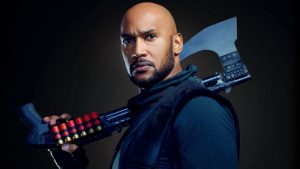
For Mack and Deke, the end of their 80’s adventure comes with some bittersweet emotions. Mack gets to briefly meet a younger version of himself, and slowly begins to heal from the trauma of his parents’ death. Deke comes into his own and discovers a warrior (and fairly talented vocalist) within himself. So even though this episode took us away from the main plotline briefly, I’m glad we got to see it: it gave me a lot of the character development I’ve been looking for from this season – and, of course, rock and roll music, which is never not a good thing.
Episode Rating: 8.5/10


